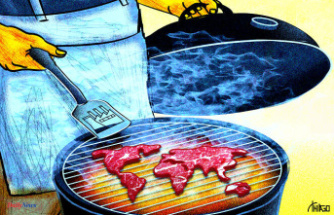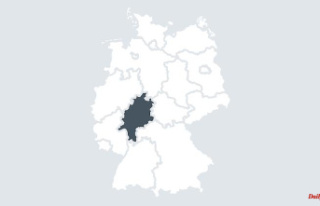Latin - many associate it with agonizing cramming. A small but growing community, on the other hand, happily converses in the language of the ancient Romans in their free time. An ancient language and modern terms like e-cars and selfies - how is that supposed to work?
"Do you speak English?" is probably familiar to everyone. But sometimes it's also: "Loquerisne Latine?" So: "Do you speak Latin?" Many people jump when they hear the word Latin, think with horror of tough text translation - and yet the conversation in Latin is enjoying growing popularity. The community is small, but growing, according to a circle in Berlin, which also meets regularly to chat about Latin at the regulars' table. And Latin teacher Christian Kupfer reports on a lively meeting in Lichtenau-Dalheim in North Rhine-Westphalia, where people chatted happily in the ancient language.
"A lot is happening in the world of Latin speaking," says Kupfer. His conversation course "Salvete - greetings" was immediately booked out with 15 participants. The Latin fans came from several federal states - from a primary school student to an elderly pensioner, all age groups were represented. But don't you just have no words today when it comes to e-cars or selfies that the Romans could not have imagined 2000 years ago?
Anything goes, says the teacher from Munich, who speaks fluent Latin. Casual conversations to warm up could sound like this: "Venio Colonia" - I'm from Cologne - or "Habito in Bavaria" - I live in Bavaria. When chatting about hobbies, you can talk about jogging ("currere") or swimming ("natare"). You can invite yourself to coffee - to the "potio Arabica" or to the "coffeum". Competing modes of translation occur from time to time. Especially with words that did not exist in antiquity.
For "selfie" some neo-Romans say "ipsulum" - formed from "ipse" (self), explains Kupfer. The electric car is an "autocinetum electricum" and the Internet is the "network of all peoples" - "rete omnium gentium". So sometimes it's time to get creative. And every now and then something has to be formulated in a roundabout way. Example: ENT practices had not yet been invented in ancient Rome. So you paraphrase: "I go to a doctor who is familiar with the ear, nose and ears".
The Berlin Latin Friends say that many thousands of people around the world are currently practicing Latin. The "Speaking Latin" group is enjoying growing popularity, as Viktor Becher says. "There's a trend of Latin coming back to life." It was also recognized for Latin: "You only learn a language by speaking it, communication is the key."
"It runs from A to Z in Latin," reports Becher from the regulars' table. "We also talk about shallow topics, but speaking Latin is not an end in itself, it is in the service of language learning." People who have nothing to do with Latin at university or at work also take part in the meetings and courses. Many are fans of classical literature. Unfortunately, the choice of texts in schools is often limited to Caesar's battles. "That doesn't help you in the beer garden and that's very unfortunate because there are such beautiful comedies and satirical texts."
Stefan Freund, chairman of the Classics Association, observes a "manageable but very international world" of active Latin speakers. Decentralized circles have come together in some cities, in addition to Berlin, for example, in Freiburg. Most fans are not students or university teachers. Initially, the joy of it blossomed "in fan circles". After that, the community grew. Latin fans mostly find out about meetings via Facebook or e-mail (epistula electronica), adds Kupfer. Regular Latin weeks are bigger than summer seminars, sometimes with Roman cooking or with theater - this is known from Hesse, Madrid or Rome.
The language of Caesar even appears on TV and streaming services: For example, Netflix 2020 with the series "Barbarians" and later the action ten-part series "Romulus" on Sky Italia and Magenta TV. The exhibition "Latin. Dead or Alive?" is currently running in Lichtenau-Dalheim. with good attendance.
"Latin can also be used for small talk, you can sing Latin songs or talk about comics in Latin," says Alexander Brehm, who was present at the conversation day in Lichtenau-Dalheim. The 24-year-old student from Paderborn is also excited: "You can use Latin to derive many technical terms that are asked for in quizzes, for example" - and understand inscriptions on old buildings. Even elementary school student Mats Hartwich from Bad Arolsen in Hesse already speaks a little Latin. The youngest student at the age of ten says: "Latin is the language of the Romans and I really like the Romans." His goal: "I want to be able to speak Latin well because I might want to become an archaeologist later."












